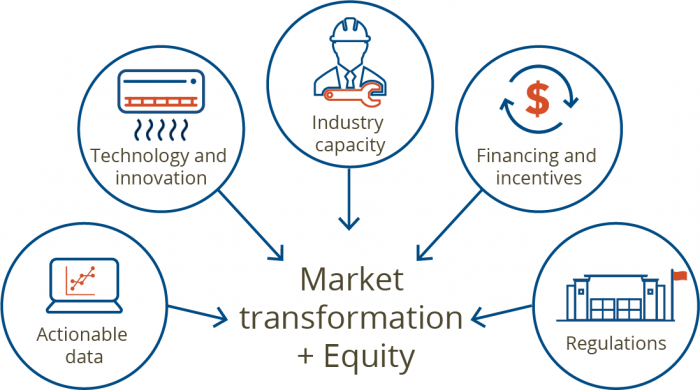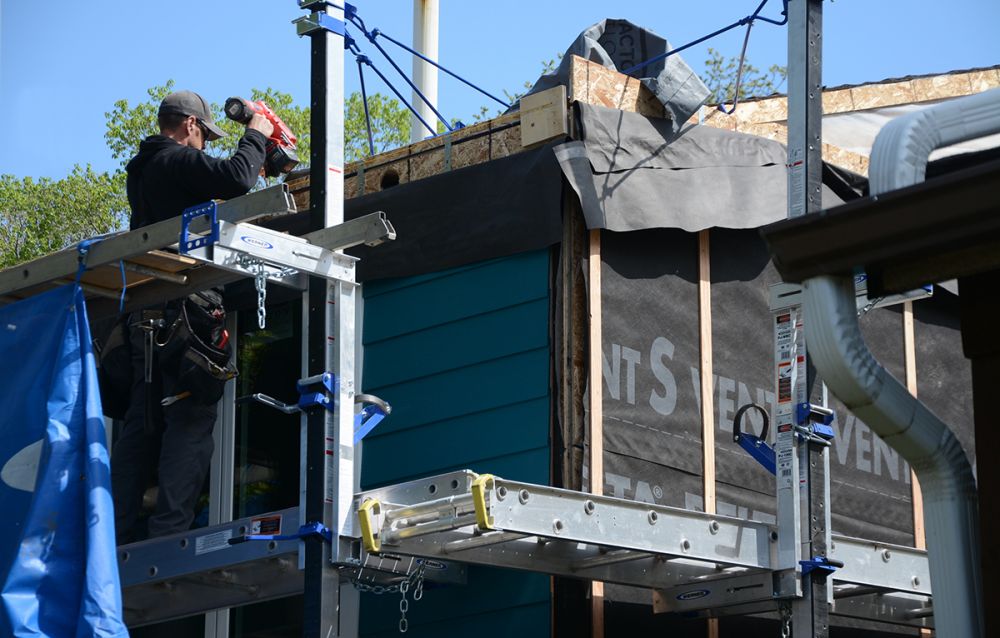Municipalities accelerating deep retrofits
Resources for local governments
Canadian municipalities have an opportunity to help drive demand for and supply of deep retrofits by focusing their jurisdictional authority on cutting carbon from existing buildings. A comprehensive building retrofit strategy can be broken down into six key areas: financing and incentives, industry capacity, technology and innovation, actionable data, equity, and regulations (Figure 1).

Figure 1. Five pillars framework for scaling up building retrofits
Within this framework, we differentiate between supporting and transformative policies. Supporting policies facilitate incremental improvements by providing resources, capital, and building up capacity to ready the stakeholders and public for the transformative policies. Transformative policies are game-changing and designed to create widespread, systemic change, such as through regulations, mandated targets, or legislation, that require significant changes to the incumbent system to effect change in the entire industry and cultural shift to support deep retrofits.
With the support of NRCan funding from 2018 through 2020, the Pembina Institute and partners researched strategic actions local governments can take to help create broad scale deep retrofit market transformation. Here is a summary of the resources that were developed during that period.
Actionable data
Provide actionable data to facilitate access and sharing and support public education and outreach, policy and incentive design, and monitoring and verification of retrofit outcomes.
Technology and innovation
Support standards development and local manufacturing and/or certification of imported of high performance components; drive market availability of deep retrofit solutions by prioritizing deep retrofits on public assets through innovative public procurement.
- Sundance Housing Retrofit webinar
- Prefabricated panels and deep retrofits primer and webinar
- Heat pumps and deep retrofits primer and webinar
- Climate resilience and deep retrofits primer and webinar
- Solar panels and deep retrofits primer and webinar
- Embodied carbon and deep retrofits primer and webinar
- Heat pump carbon case (coming soon!)
- Deep retrofit incubators to support demonstration projects
- Reframed Initiative (B.C.)
- ReCover Initiative (Nova Scotia)
- Retrofit Canada (Climate Action Edmonton)
- WHERE-NS (Whole Home Energy Retrofit Envelope – Nova Scotia)
Industry capacity
Prime market transformation by investing in the deep retrofit market, leading by example by procuring deep retrofits for public assets, supporting delivery of training, and partnering on community demonstration projects.
- Rebuilding a Resilient B.C.
- Green Stimulus: Principles and recommendations for a 2020 economic stimulus package
- Accelerating B.C.’s economic recovery through building retrofits: Submission to the Government of British Columbia
- Training up for deep retrofits: Skilled trades are key to transforming Canada’s building sector
- Retrofit supply chain map — Industry leaders who would like to be featured on this map can register their businesses here.
Financing and incentives
Partner with senior levels of government to provide long-term, adaptable, and outcome-focused mechanisms that deliver loans and grants to build the deep retrofit business case and stimulate local economic development.
- Property Assessed Clean Energy in Canada: Design considerations for PACE programs and enabling legislation
- Property assessed clean energy enabling legislation
- Solar panels boost business case for electrifying multi-unit low-rise housing
- Low-rise MURB deep retrofit costing study (coming soon!)
- Getting to Scale: Decarbonizing the Canadian Building Stock (coming soon!)
Regulations
Create regulatory requirements to get buildings off fossil fuel and remove regulatory barriers to the innovations needed to get reach that goal.
- Barriers to deep retrofits: Regulatory solutions from across Canada
- Faster permitting and better retrofit projects
Watch this space for our Blueprint for Building Retrofits at Scale, which identifies three transformational policies for reaching the pace and depth of retrofits B.C. needs to meet its climate targets.
Equity
Close the cost gap to ensure equity is designed into deep retrofit programs; proactively work with low-income and vulnerable residents to address energy poverty, improve health outcomes, and protect renters from renovictions.
- Retrofitting with tenants in place (case study)
- Capturing the Full Value of Deep Building Retrofits
- Co-benefits fact sheets
- Impacts of climate change on occupant health
- Beyond energy efficiency - retrofitting for resilience
About the Local Government Readiness project
Between December 2018 and 2020, the Pembina Institute worked with Canadian municipalities on understanding barriers and opportunities to help stimulate the market transformation needed to accelerate deep retrofits for existing buildings. This project was a coast-to-coast effort made possible thanks to:
Micah Lang and Brenda Scott Castro, City of Vancouver, Derek De Candole, City of Kamloops; Mark Brostrom, Leon Milner and Maurya Braun, City of Edmonton; Trevor Imhoff, City of Hamilton, Sean Botham, CityHousing Hamilton, Katherine Flynn, Mohawk College; Robyn Webb, City of Victoria; City of Calgary; Karen Neville, Cape Breton Regional District; Ben Grieder, Ecology Action Centre; Charity Carr, Efficiency Nova Scotia; Allison Ashcroft, CUSP; Robyn Wark, BC Hydro
Funding partners
- Vancouver
- Kamloops
- Edmonton
- Hamilton
- Mohawk College
- NRCan
